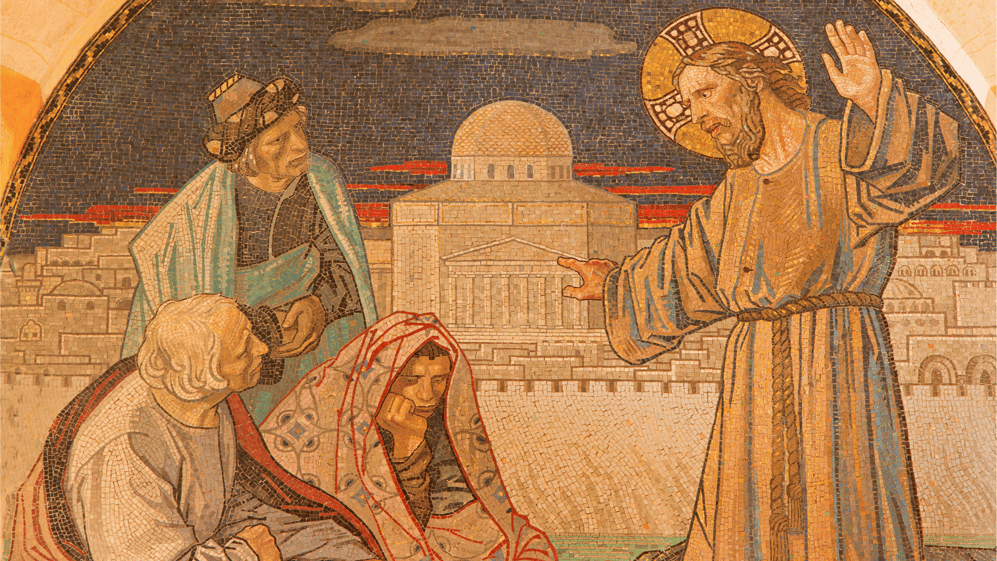Explore Christ’s great confession, “Before Abraham was, I am” (John 8:58), to the Pharisees and the highlights of John’s Greek with Rev. Phil Rigdon.
Setting the Scene for John 8:48–59
Jesus is in the middle of His public ministry during this encounter with the Jews. Our Lord is in Jerusalem at the temple, teaching at the Feast of Tabernacles. Leading up to our reading for this month, Jesus has asserted that He is the Christ and has received disbelief from those who should most vehemently embrace Him. The Jews have challenged the validity of Jesus’ testimony and argued with Him on the meaning of being children of Abraham. During this contention, as the Jews assert that they are descended from Abraham and have God as their Father, Jesus tells them that their father is the devil and they belong to Him.
From here, Jesus continues His dialogue with the Jews, asserting His place in the Trinity.
Mining the Gems
- While sinful, it is understandable that the Jews would accuse Jesus of being possessed by a demon since He just asserted their demonic parentage, as they do in verse 48: “Are we not right in saying that You are a Samaritan and have a demon?” Jesus responds in force in a manner that the Greek brings out. “I do not have a demon,” Jesus says in verse 49. They Greek reads, Ἐγὼ δαιμόνιον οὐκ ἔχω. The Greek includes not only ἔχω (I have) but also the additional Ἐγὼ (I). Grammatically, the additional Ἐγὼ is not needed but adds emphasis. We can picture the Lord intensifying His voice to exclaim, “I do not have a demon!”
- Verse 51 reads, “Truly, truly, I say to you, if anyone keeps My word, he will never see death.” The Greek adds stress by including οὐ μὴ (certainly not, never). Where οὐ is sufficient to convey “no” or “not,” οὐ μὴ strengthens the point. As usual, the Jews misunderstand, assuming that Jesus means physical death, whereas Jesus is referring to spiritual death.
- In verse 55, Jesus asserts, “But you have not known Him.” This is a correct translation of the Greek perfect tense οὐκ ἐγνώκατε. The perfect tense, which conveys an action that has been accomplished in the past and now has implications for the present, is appropriate here. Jesus is telling those present that, although they claim to have God as their Father, they have never known Him. It is this ignorance that renders them unable to recognize the Son. If they knew the Father, they would know the Son and vice versa.
Study
- John 8:50 reads, “Yet I do not seek My own glory; there is One who seeks it, and He is the judge.” Jesus interestingly connects Himself to both the Father and the Holy Spirit. In John 17:1, Jesus prays for the disciples and says, “Father, the hour has come; glorify Your Son that the Son may glorify You.” In John 16:14, Jesus says regarding the Holy Spirit, “He will glorify Me, for He will take what is Mine and declare it to you.” All three persons of the Trinity are one God. Both the Father and the Holy Spirit glorify the Son.
- In John 8:58, Jesus declares, “Truly, truly, I say to you, before Abraham was, I am.” If the Jews claim significance before God for the sake of having Abraham as their ancestor, Jesus will show them one better. Where Abraham was merely a human man, Jesus is eternal, the great I AM. We should be mindful of Exodus 3, where God calls Moses by the burning bush: “God said to Moses, ‘I AM WHO I AM.’ And He said, ‘Say this to the people of Israel: ‘I AM has sent me to you.’ ” By referring to Himself as I AM, Jesus is showing that He is the God the Jews claim to have as their Father. In fact, Jesus participated in the calling of Moses.
Law
- The Jews contesting Jesus demonstrates the reality of the unregenerate sinful nature. Without Christ, they do not have the Father and will not know Him. Not only are they not children of the heavenly Father, but have, in fact, the devil as their father. This is the sad reality for all those who do not know Jesus Christ.
- The Holy Spirit convicts the world of the sin of denying or minimizing the reality of the Trinity. This includes the ideas that Jesus is not God or only God in part, that it is possible to have the Father without the Son, that the Holy Spirit operates of His own authority, and so forth.
- There is also the danger of ascribing characteristics of God to only one person of the Trinity, that the Father is the just, stern part of God, and that the Son, conversely, comes in grace and mercy.
Gospel
- John 8:56 reads, “Your father Abraham rejoiced that he would see My day. He saw it and was glad.” Even during contention, Jesus points to the Gospel, that Abraham rejoiced to see the fulfillment of the promise, that God the Son took on flesh, fulfilled all righteousness, and suffered for sins, that we could be called righteous through faith.
- Through the keeping of Jesus’ Word, which is our Lord’s counsel of salvation through His death and resurrection, there is forgiveness of sins and life eternal.
Scripture: ESV®.
Dig deeper into Scripture with the John 1:1–7:1 Concordia Commentary!














